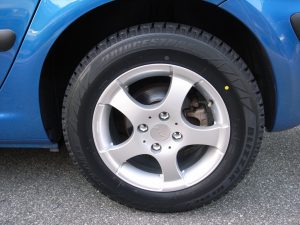
SUMMER STARTS HERE!
View our Specials for current Offer
Discover our Lineup
ALL-NEW 2024 Tacoma is here! Get Behind the Wheel and Test Drive Today
Visit Us at 1399 Riverdale Street West Springfield
 Before you know it, the temperatures are going to drop, it’s going to start snowing in Massachusetts, and it will be time to put winter tires back on your vehicle. However, you may wonder if you really need winter tires or if you can use all-season tires throughout the winter. Keep reading to learn about the benefits of winter tires versus all-season tires.
Before you know it, the temperatures are going to drop, it’s going to start snowing in Massachusetts, and it will be time to put winter tires back on your vehicle. However, you may wonder if you really need winter tires or if you can use all-season tires throughout the winter. Keep reading to learn about the benefits of winter tires versus all-season tires.
All-Season Tires
When most cars leave the factory, they come with a set of all-season tires because they’re designed to offer a smooth ride, good gas mileage, and decent tread life. Not only that, they’re also built to handle a variety of conditions, including wet roads and light snow. However, just because they’re designed to handle most seasons, that doesn’t mean you should use them in all seasons.
To offer the kind of performance drivers want on dry roads, all-season tires have to give up some of the handling you need to take on snowy roads. All-season tires aren’t designed to effectively handle icy roads or push through a few inches of snow.
Winter Tires
On the other hand, winter tires are specifically designed to handle the unpredictable conditions you’ll face during the winter. Winter tires come with thousands of small slits in the tread that help provide traction on snow and ice. Winter tires also come with a special tread pattern and deeper tread depths. The pattern pushes water, slush, and snow out and away from the tire, and the deeper tread gives you better traction and reduces snow buildup around the tire.
Finally, winter tires are made with a unique type of rubber. When temperatures drop, the regular rubber you find on all-season tires stiffens, which makes it harder for the tire to gain traction. However, the rubber that goes into winter tires stays pliable even in sub-zero temperatures, so you get a better grip on the road and can handle those unexpected slips and slides.
Which One Is Best for You?
Deciding between all-season tires and winter tires depends entirely on the type of conditions you typically encounter during the winter. Since snowy and icy roads are an annual occurrence in Springfield, putting on winter tires is a safety precaution you shouldn’t skip.
When you take your vehicle to Balise Toyota Scion to get winter tires mounted, make sure you have a full set put on. Just changing the front tires increases the chances that your rear tires will skid in slick or icy conditions, and just changing the rear tires doesn’t give your front tires the traction they need. Additionally, don’t forget to get your all-season tires put back on when spring arrives. Winter tires don’t have the same handling capabilities as all-season tires, and they wear out faster when roads are dry and warm.
As colder weather approaches, make sure you’re ready to handle the challenges of winter driving by switching out your all-season tires for a set of winter tires. With a set of tires for warm weather and a set of tires for cold weather, you can enjoy a safer ride.
https://www.flickr.com/photos/shrk/312677831/sizes/l
Image via Flickr by shrk


